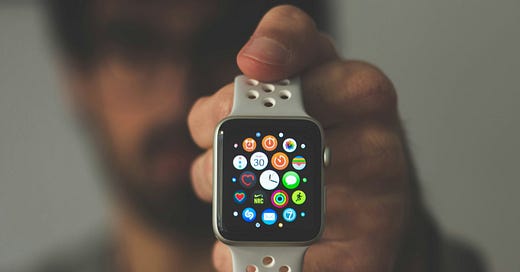What we lose when we track everything
Falling down the rabbit hole of self-optimization
Dear Rethinkers,
Around this time last year, my teenage son asked if I would start running with him. What a lovely idea, I thought. The problem? I couldn’t even jog to the park a piddly kilometer away without feeling out of breath. But, determined not to let him down, I set a goal: run 1K every day for a month and see what happened.
What happened was an unexpected journey. One kilometer became five. Five became ten. Soon, my son and I ran our first 10K race “together”—by which I mean we did the pre-race warm-up side by side before he vanished like a sprightly gazelle. The goal of running with him had happened and it was a beautiful thing. I should have stopped there.
I did not.
The perfectionist that I am, I’m not wired to stop. It's hard to see progress not as a stable line, but as a constant, ever-moving upward trajectory
Enter: the Garmin watch. A thoughtful gift from a friend, given as a thank-you for helping with her garden. I put it on and suddenly had access to an entirely new world. Heart rate variability! VO2 max! Lactate threshold! What even was an HRV? I didn’t know, but I needed to make mine better. I was hooked.
“Why isn’t 10K enough?” my wise daughter asked.
“Because,” I told her, “my watch thinks I can do better.”
And just like that, I was falling fast into the rabbit hole of self-optimization, a proud new member of the so-called ‘quantified self’, a term first coined in 2007 by Wired editor Kevin Kelly to describe the concept of “self-knowledge through numbers.”
Of course, there are wonderful upsides to all of this. For the first time in a long while, I feel genuinely fit and healthy. I can’t believe how much mental and physical strength I’ve developed in a relatively short window. I’ve even been training to run the London Marathon in three weeks—all 26.2 miles—for Get Kids Going.
Despite the benefits, this experience has fundamentally changed the way I view self-tracking.
For Rethink paid subscribers, I explore what we can learn from Benjamin Franklin’s self-improvement system, how we can build a healthier relationship with tracking, and invite you to share your own experiences.





